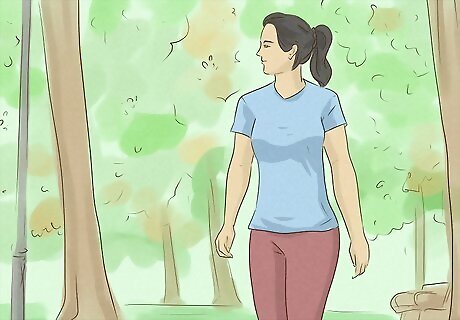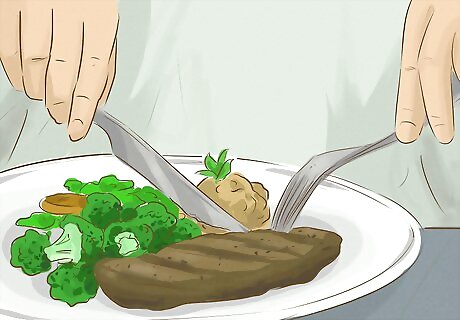
views
Interact with the outside world.

Stepping out into nature can lower your stress levels. When you have a break from work or school, try going for a walk in your neighborhood. On the weekends, hit up a hiking trail or a local swimming spot to soak up the sun. The more you can get outside, the happier you’ll feel. Exercising outside is a nice way to combine 2 things that are both great for you.
Do something you like every day.

A little self-care can really boost your mood. Pick out something that makes you happy: it could be art, crafts, reading, listening to music, playing with a pet, or watching a TV show. Try to schedule 20 to 30 minutes every day to sit down and enjoy your favorite activity. Carving out some time every day for yourself is a great way to relax and take care of your mental health.
Break up your routine.

Do something spontaneous every now and then. Take the day off work and go for a solo road trip or head out of town. Book a trip to go visit your family when they aren’t expecting it. Doing something out of the ordinary can help keep things exciting and prevent you from getting stuck in a rut. You can also do something spontaneous that isn’t a huge commitment. For instance, if you usually make breakfast at home, go out to a local bakery for a bagel instead.
Practice meditation.

Keep yourself grounded and improve your mental health. Every day, set aside 5 to 10 minutes to sit down and clear your mind. Practice breathing in through your mouth and out through your nose. If you find your mind wandering, just redirect your attention back to your breath. If you’re having trouble, look up a guided meditation video to help you along. Meditation can help lower your stress levels and improve your wellbeing over time.
Be mindful.

Keep yourself focused and in the present. When you go about your daily life, try to think about what you’re doing now, not what’s happened in the past or what might happen in the future. Staying in the moment can help you appreciate the little things in life, and it can also help reduce anxiety and stress. Practicing mindfulness can be tough at first, but it gets easier the more you practice it.
Stay connected with friends and family members.

Schedule hangouts or phone calls with your loved ones. Try to talk to someone outside of your home at least once a week. You can stay updated on each other’s lives and lean on one another for support in times of need. Connecting with others is a great way to boost your mood and improve your mental health. If your loved ones live far away, consider talking to them via video chat.
Talk about your feelings.

Try not to bottle up your emotions throughout the day. If you have close friends or family members, reach out to them and tell them how you’re feeling. If you don’t feel comfortable doing that, consider talking to a mental health professional instead. Talking through tough feelings can help your process them faster than if you keep them inside.
Keep a journal.

It can help you process your thoughts and feelings. Try to write in your journal for 5 to 10 minutes every day. You can write about what you did, how you’re feeling, or what you’re looking forward to next. If you accidentally skip a day, don’t worry—it’s your journal, and you can write in it whenever you want! Keep your journal in a private spot where no one else can read it.
Connect with your community.

Volunteer or take a class at your community center. Join a hiking group to meet new people with the same hobby as you. Sign up for a class to learn a new language or artform. Try to make connections with the people in your area to increase your social connections. You could also look around for local support groups that are specific to your needs. Look for parenting groups, mental health support groups, or caretaker support groups to find the one that’s right for you.
Say “no” to people.

If you don’t have time to do something, just decline. Taking on too many responsibilities can leave you feeling overwhelmed and undervalued. “No” is a complete sentence, and you never have to explain yourself to anyone if you don’t want to. It can be tough to say no to people at first, especially if you’re used to putting everyone’s needs ahead of your own. Try to think about how you’d tell a friend to act in this situation—if you’d tell them to say no, then you probably should too.
Get around 8 hours of sleep every night.

Sleep is great for your physical and mental health. On average, you should aim for around 7 to 9 hours of sleep every night. If you have trouble falling asleep, try turning off your phone and computer 30 minutes before bedtime and keeping your bedroom cool, dark, and quiet. Try to avoid having caffeine or sugar later in the day, as they can keep you awake at night. Most people feel best if they stop eating 2 or 3 hours before they go to bed. A wind-down routine before bed might increase your sleep quality. For example, you could have a cup of tea or write in a gratitude journal. Make sure your sleep environment is as conducive to restful sleep as possible. You could use items like blackout curtains, an eye mask, or a sound machine.
Exercise every day.

Aim for around 30 minutes every day. Getting your blood pumping and your heart racing not only keeps you fit, but it releases chemicals in your brain that make you feel good. You could try running, jogging, swimming, cycling, weight lifting, yoga, or even rock climbing. If you haven’t exercised in a while, start out by going slow. It’s better to work your way up to a huge workout than go too hard and injure yourself.
Eat a balanced diet.

Give your body the nutrients it needs. Try to eat 3 meals per day that have 1/2 a plate of lean protein, 1/4 of a plate of fruits and veggies, and 1/4 of a plate of whole grains. Add some plant oils in moderation for a complete and balanced meal. Try to drink water instead of sugary sodas or juices to stay hydrated. If you’re having trouble getting all the nutrients you need, talk to your doctor about taking a multivitamin. Avoid processed foods and foods with added sugar, as they're harder to digest.
















Comments
0 comment